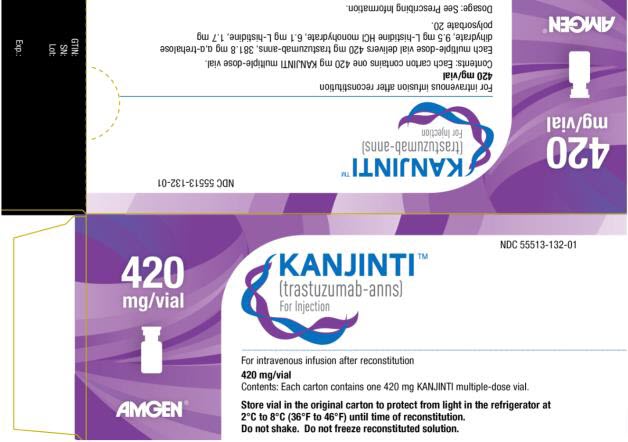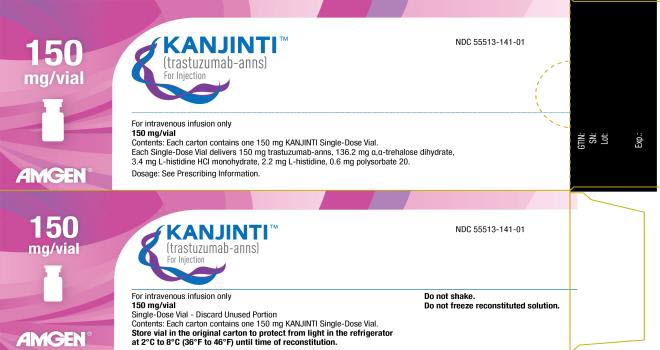Kanjinti | Trastuzumab-anns Injection, Powder, Lyophilized, For Solution while Breastfeeding

What is Kanjinti | Trastuzumab-anns Injection, Powder, Lyophilized, For Solution ?
Is using Kanjinti | Trastuzumab-anns Injection, Powder, Lyophilized, For Solution safe or dangerous while breastfeeding?

Kanjinti | Trastuzumab-anns Injection, Powder, Lyophilized, For Solution Breastfeeding Analsys
Trastuzumab while Breastfeeding
UnsafeCAS Number: 180288-69-1
Anticuerpo monoclonal recombinante inmunoglobulina G1 dirigido contra la proteína producida por el gen HER2 (receptor 2 de factor de crecimiento epidérmico humano) sobreexpresado en 25 a 30% de cánceres de pecho. A fecha de última actualización no encontramos datos publicados sobre su excreción en leche materna. Su elevado peso molecular y su naturaleza protéica hacen prácticamente imposible tanto el paso a leche como la absorción intestinal por parte del lactante: Su baja biodisponibilidad oral dificulta el paso a plasma del lactante a partir de la leche materna ingerida, salvo en prematuros y periodo neonatal inmediato, en los que puede haber mayor permeabilidad intestinal. Aunque posiblemente seguro durante la lactancia, su muy larga semivida de eliminación (18 a 28,5 días) y sus posibles efectos secundarios hacen que hasta conocer más datos publicados sobre este fármaco pueda ser prudente no amamantar. El periodo de "lavado" (tiempo que tarda el medicamento en eliminarse por completo del organismo) a esperar a amamantar serían 143 días (5 vidas medias) tras la última dosis. A tener en cuenta que la vida media de Trastuzumab emtansina es mucho más corta, de tan sólo unos 4 días.
Kanjinti | Trastuzumab-anns Injection, Powder, Lyophilized, For Solution Breastfeeding Analsys - 2
Trastuzumab while Breastfeeding
CAS Number: 180288-69-1

No information is available on the clinical use of trastuzumab during breastfeeding. Because trastuzumab is a large protein molecule with a molecular weight of 145,531, the amount in milk is likely to be very low and absorption is unlikely because it is probably destroyed in the infant's gastrointestinal tract. Until more data become available, trastuzumab should be used with caution during breastfeeding, especially while nursing a newborn or preterm infant.[1] The manufacturer recommends that breastfeeding be discontinued during trastuzumab therapy and for 7 months after the last dose. Trastuzumab is a human immunoglobulin G1 (IgG1) kappa antibody. Holder pasteurization (62.5 degrees C for 30 minutes) decreases the concentration of endogenous immunoglobulin G by up to 79%.[2][3] A study of 67 colostrum samples that underwent Holder pasteurization found that IgG amounts decreased by 34 to 40%. Specific IgG subclasses decreased by different amounts, with IgG1 activity decreasing by about 37%.[4] None of the studies measured IgG activity.
I am nursing mother and I have already used Kanjinti | Trastuzumab-anns Injection, Powder, Lyophilized, For Solution, what should I do?
If you observer abnormal behavior or any other health issue in infant then you should immediately call 911 or contact other contact other emergency service provider in your area otherwise closely monitor the baby and inform your doctor about your Kanjinti | Trastuzumab-anns Injection, Powder, Lyophilized, For Solution usage and time interval of breastfeeding.
My doctor has prescribed me Kanjinti | Trastuzumab-anns Injection, Powder, Lyophilized, For Solution, what should I do?
If your doctor knows that you are breastfeeding mother and still prescribes Kanjinti | Trastuzumab-anns Injection, Powder, Lyophilized, For Solution then there must be good reason for that as Kanjinti | Trastuzumab-anns Injection, Powder, Lyophilized, For Solution is considered unsafe, It usually happens when doctor finds that overall advantage of taking
If I am using Kanjinti | Trastuzumab-anns Injection, Powder, Lyophilized, For Solution, will my baby need extra monitoring?
Yes, Extra monitoring is required if mother is using Kanjinti | Trastuzumab-anns Injection, Powder, Lyophilized, For Solution and breastfeeding as it is considered unsafe for baby.
Who can I talk to if I have questions about usage of Kanjinti | Trastuzumab-anns Injection, Powder, Lyophilized, For Solution in breastfeeding?
US
National Womens Health and Breastfeeding Helpline: 800-994-9662 (TDD 888-220-5446) 9 a.m. and 6 p.m. ET, Monday through Friday
UK
National Breastfeeding Helpline: 0300-100-0212 9.30am to 9.30pm, daily
Association of Breastfeeding Mothers: 0300-330-5453
La Leche League: 0345-120-2918
The Breastfeeding Network supporter line in Bengali and Sylheti: 0300-456-2421
National Childbirth Trust (NCT): 0300-330-0700
Australia
National Breastfeeding Helpline: 1800-686-268 24 hours a day, 7 days a week
Canada
Telehealth Ontario for breastfeeding: 1-866-797-0000 24 hours a day, 7 days a week
